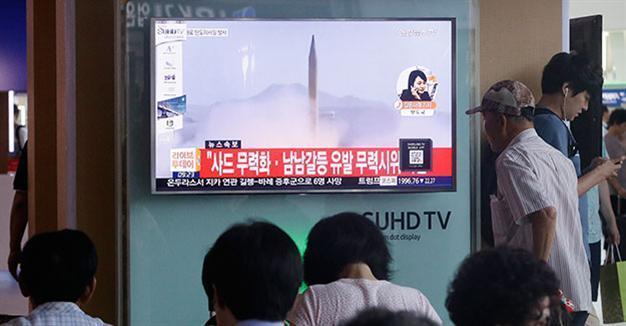Latest North Korea missile launch lands near Japan waters, alarms Tokyo
SEOUL – Reuters

South Koreans watch a TV news program airing file footage of a North Korean rocket launch at the Seoul Railway Station in Seoul, South Korea, Wednesday, Aug. 3, 2016. AP photo
North Korea launched a ballistic missile on Aug. 3 that landed in or near Japanese-controlled waters for the first time, the latest in a series of launches by the isolated country in defiance of United Nations Security Council resolutions.The main body of the missile landed in Japan’s economic exclusion zone, a Japanese defense official said, escalating regional tensions that were already high after a series of missile launches this year and the decision by the United States to place a sophisticated anti-missile system in South Korea.
Japanese Prime Minister Shinzo Abe described the launch as a “grave threat” to Japan and said Tokyo “strongly protested.”
Japan also said its self-defense force would remain on alert in case of further launches.
A U.S. State Department spokesman condemned the launch, and said it would “only increase the international community’s resolve to counter” North Korea’s actions.
The U.S. Strategic Command said it had detected two missiles, one of which it said exploded immediately after launch.
The missile that landed in the Sea of Japan was launched at about 7:50 a.m. Seoul time (10:50 p.m. GMT Aug. 2) from a region in South Hwanghae province to the southwest of North Korea’s capital, Pyongyang, South Korea’s Office of the Joint Chiefs of Staff said in a statement.
The launch showed North Korea’s ambition to “directly and broadly attack neighboring countries and target several places in the Republic of Korea such as ports and airfields,” the South Korean office said, referring to South Korea by its official title.
The missile appeared to be a Rodong-type medium-range missile that flew about 1,000 km (620 miles), it said.
The United States will begin large-scale annual drills with its ally South Korea later this month that it bills as defensive in nature and not provocative. North Korea typically protests against the drills, which it says are a rehearsal for invasion.
“The North Koreans seem to have been timing their recent short-range and medium-range missile tests to the weeks ahead of U.S.-South Korean joint exercises,” said Joshua Pollack, editor of the U.S.-based Nonproliferation Review.
“If the allies can exercise their armed forces, so can the North,” he said.
















